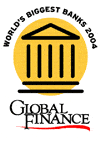Global Finance ranks the world’s 50 biggest banks, as measured by total assets.

They have also had to keep a keen eye on oil prices, which went on a wild ride through the summer. In many countries, the increased oil prices caused a spike in inflation, leaving bankers to decide if they should act to trim inflation and risk over-reacting. In the end, many seemed to be shrugging off the potential impact of rising oil prices, provoking some consternation among observers.
Its likely that they were looking at the general economic conditions, both in their own countries and across the world, and concluding that they should hold their fire. Most central bankers have benefited from the gentleand generalimprovement in the worlds major economies. Certainly few have had any major crises to deal with and, being a competent bunch, theyve mostly handled the minor upheavals of the past year without too much fuss.
While most have maintained fairly consistent performance since last year, a few central bankers stand out for their improved handling of their countries economies. One is Switzerlands Jean-Pierre Roth, who finally seems to have grasped the nettle and taken control at the central bank. His grade leaps from a D to a B in recognition of his startling turnaround. Canadas David Dodge inches up half a grade as he, too, seems to be getting the measure of the job after a fitful start. Another central banker who flunked out last year is Alan Greenspan. This year he scrapes a C on the basis that hes done a reasonable job in what remain difficult circumstances. Expect to see Greenspans grade improve next year, though, as his most recent performances have been more reminiscent of the market guru of old.
Again this year, the general level of competence among the worlds central bankers seems to have increased noticeably. That can only be a good thing for the worlds economies.
|
Rank |
Name |
Country |
Fiscal Year |
Total Assets in $B |
| 1 | Mizuho Financial Group |
Japan |
3/2004 |
1,285.7 |
| 2 |
Citigroup |
United States |
12/2003 |
1,264.0 |
| 3 |
UBS |
Switzerland |
3/2004 |
1,120.6 |
| 4 |
HSBC |
United Kingdom |
12/2003 |
1,034.2 |
| 5 | Deutsche Bank |
Germany |
3/2004 |
1,014.8 |
| 6 | Crdit Agricole |
France |
12/2003 |
992.7 |
| 7= | BNP Paribas |
France |
12/2003 |
988.9 |
| 7= | Mitsubishi Tokyo Financial Group |
Japan |
3/2004 |
988.9 |
| 9 | ING Groep |
Netherlands |
3/2004 |
983.5 |
| 10 | Sumitomo Mitsui Financial Group |
Japan |
3/2004 |
950.5 |
| 11 |
Royal Bank of Scotland Group |
United Kingdom |
12/2003 |
806.2 |
| 12 |
Credit Suisse Group |
Switzerland |
12/2003 |
777.9 |
| 13 |
Barclays Bank |
United Kingdom |
12/2003 |
776.7 |
| 14 |
JPMorgan Chase |
United States |
12/2003 |
770.9 |
| 15 | UFJ Holdings |
Japan |
3/2004 |
762.1 |
| 16 |
Bank of America |
United States |
12/2003 |
736.4 |
| 17 |
HBOS |
United Kingdom |
12/2003 |
728.9 |
| 18 | ABN AMRO |
Netherlands |
12/2003 |
707.8 |
| 19 |
Socit Gnrale |
France |
12/2003 |
681.2 |
| 20 |
Fortis Belgium |
Belgium |
12/2003 |
653.5 |
| 21 |
Industrial & Commercial Bank of China |
China |
12/2003 |
637.8 |
| 22 |
Morgan Stanley |
United States |
2/2004 |
602.8 |
| 23 |
Dresdner Bank |
Germany |
12/2003 |
602.5 |
| 24 |
Bayerische Hypo-und Vereinsbank |
Germany |
3/2004 |
597.6 |
| 25 |
Rabobank Group |
Netherlands |
12/2003 |
509.4 |
| 26 |
Norinchukin Bank |
Japan |
3/2004 |
506.7 |
| 27 |
Merrill Lynch |
United States |
3/2004 |
494.5 |
| 28 |
Commerzbank |
Germany |
3/2004 |
481.7 |
| 29 |
Groupe Caisse d’Epargne |
France |
12/2003 |
480.8 |
| 30 |
Groupe Caisse des Dpts |
France |
12/2003 |
480.0 |
| 31 |
Bank of China |
China |
12/2003 |
464.2 |
| 32 |
Dexia |
Belgium |
12/2003 |
441.4 |
| 33 |
Banco Santander Central Hispano |
Spain |
3/2004 |
437.5 |
| 34 |
China Construction Bank |
China |
12/2003 |
429.4 |
| 35 |
DZ Bank |
Germany |
12/2003 |
406.7 |
|
36 |
Goldman Sachs Group |
United States |
11/2003 |
403.8 |
|
37 |
Sakura Bank |
Japan |
3/2001 |
402.6 |
|
38 |
Landesbank Baden-Wuerttemberg |
Germany |
12/2003 |
395.0 |
|
39 |
Wells Fargo |
United States |
12/2003 |
387.8 |
|
40 |
Bayerische Landesbank |
Germany |
12/2003 |
380.0 |
|
41 |
KfW Group |
Germany |
12/2003 |
379.7 |
|
42 |
Resona Holdings |
Japan |
3/2004 |
366.3 |
|
43 |
Lloyds TSB Bank |
United Kingdom |
12/2003 |
363.6 |
|
44 |
Agricultural Bank of China |
China |
12/2002 |
359.6 |
|
45 |
Banco Bilbao Vizcaya Argentaria |
Spain |
12/2003 |
356.9 |
|
46 |
NRW Bank |
Germany |
12/2002 |
356.8 |
|
47 |
Nordea Bank |
Sweden |
12/2003 |
331.1 |
|
48 |
Almanij |
Belgium |
12/2003 |
327.9 |
|
49 |
Banca Intesa |
Italy |
3/2004 |
327.4 |
|
50 |
WestLB |
Germany |
12/2003 |
321.6 |



